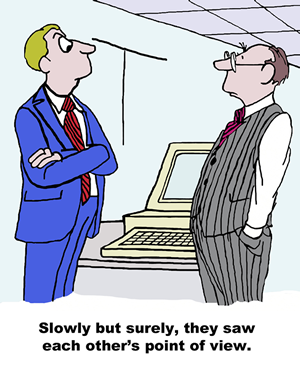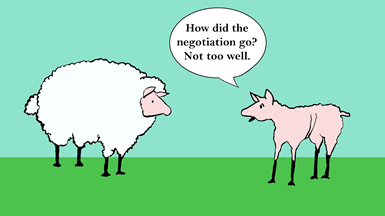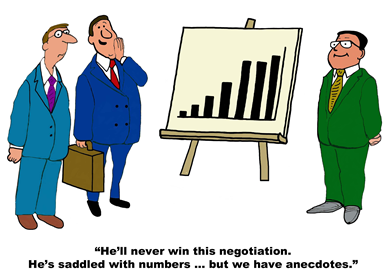The negotiator's skill lies in being as arbitrary as necessary to obtain the best possible compromise without actually destroying the basis for voluntary mutual cooperation or self-restraint. There are some commonsense rules for success in such an endeavor:
1. Be sure that your rival is fully aware of what he can gain if he cooperates and what it will cost him if he does not | 2. Avoid any action which will arouse his emotions, since it is essential that he behave in a logical, reasonable fashion | 3. Convince your opponent that you are emotionally dedicated to your position and are completely convinced that it is reasonable.
It is worth emphasizing that your competitor is under the maximum handicap if he acts in a completely rational, objective, and logical fashion. For then he will cooperate as long as he thinks he benefits at all. In fact, if he is completely logical, he will not forgo the profit of cooperation as long as there is any net benefit.
It may strike most businessmen as strange to talk about cooperation with competitors. But it is hard to visualize a situation in which it would be worthwhile to pursue competition to the utter destruction of a competitor. In every case there is a greater advantage to reducing the competition on the condition that the competitor does likewise. Such mutual restraint is cooperation, whether recognized as such or not Without cooperation on the part of competitors, there can be no stability. Businessmen should notice the similarity of their economic competition to the peacetime behavior of nations. The object in both cases is to achieve a voluntary, cooperative restraint on the aggressiveness of competitors. Complete elimination of competition is almost inconceivable. The goal of the hottest economic war is an agreement for coexistence, not annihilation. The competition and mutual encroachment do not stop; they go on forever. But they do so under some measure of mutual restraint.
A breakdown in negotiations is inevitable if both parties persist in arbitrary positions which are incompatible. Yet we have identified major areas in business where some degree of arbitrary behavior is essential for protecting a company's self-interest. In effect, a type of brinkmanship is necessary. The term was coined to describe cold war international diplomacy, but it describes a normal pattern in business, too.
In a confrontation between parties who are part competitors and part cooperators, the decision as to what to accept is essentially emotional or arbitrary. The decision as to what is attainable is essentially an evaluation of the other party's degree of intransigence. The purpose is to convince him that you are arbitrary and emotionally committed while trying to discover what he would really accept in settlement. The competitor known to be coldly logical is at a great disadvantage. Logically, he can afford to compromise until there is no advantage left in cooperation. If, instead, he is emotional, irrational, and arbitrary, he has a great advantage.
The heart of business strategy for a company is the creation of attitudes on the part of its competitors that will cause them either to restrain themselves or to act in a fashion which management deems advantageous. In diplomacy and military strategy the key to success is very much the same.
The most easily recognized way of enforcing cooperation is to exhibit obvious willingness to use irresistible or overwhelming force. This requires little strategic skill, but there is the problem of producing conviction in the competing organization that the force will be used without actually resorting to it (which is expensive and inconvenient).
In industry, however, the available force is usually not overwhelming, although one company may be able to inflict major punishment on another. If each party can inflict such punishment on the other, we have the classic case. If there is open conflict in such a case, then, as earlier pointed out, both parties lose. In the event of cooperation, both parties are better off but not necessarily equally so—particularly if one is trying to change the status quo.
When each party can punish the other, the prospects of agreement depend on three things: 1. Their respective willingness to accept the risk of punishment | 2. Their beliefs about each other's willingness to accept the risk of punishment | 3. Their degree of rationality in behavior.
If these conclusions are correct, what can we deduce about how advantages are gained and lost in business competition?
First, management's lack of willingness to accept the risk of punishment is almost certain to produce either the punishment or progressively more onerous conditions for cooperation—provided the competition recognizes the attitude.
Secondly, beliefs about a competitor's future behavior or response are all that determine competitive cooperation. In other words, it is the judgment not of actual capability but of probable use of capability that counts.
Thirdly, the less rational or less predictable the behavior of a competitor appears to be, the greater the advantage he possesses in establishing a favorable competitive balance. This advantage is limited only by his need to avoid forcing his competitors into an untenable position or creating an emotional antagonism that will lead them to be unreasonable and irrational (as he is).
If I were asked to distill the conditions and forces described into advice for the businessman-strategist, I would suggest five rules.
1. You must know as accurately as possible just what your competition has at stake in his contact with you. It is not what you gain or lose, but what he gains or loses, that sets the limit on his ability to compromise with you.
2. The less the competition knows about your stakes, the less advantage he has. Without a reference point, he does not even know whether you are being unreasonable.
3. It is absolutely essential to know the character, attitudes, motives, and habitual behavior of a competitor if you wish to have a negotiating advantage.
4. The more arbitrary your demands are, the better your relative competitive position— provided you do not arouse an emotional reaction.
5. The less arbitrary you can seem to be, the more arbitrary you can act in fact.
These rules make up the art of business brinkmanship. They will guide a businessman to winning a strategic victory in the minds of competitors. Once he has won it there, he can convert it into a competitive victory in terms of sales volume, costs, and profits.
The full version of this article as published in the Harvard Business Review of March 1967 is here.















